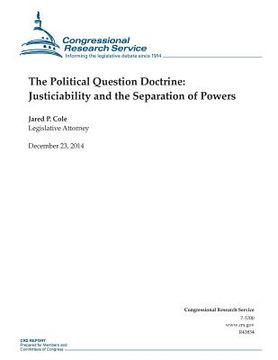Synopsis "The Political Question Doctrine: Justiciability and the Separation of Powers"
Article III of the Constitution restricts the jurisdiction of federal courts to deciding actual "Cases" and "Controversies." The Supreme Court has articulated several "justiciability" doctrines emanating from Article III that restrict when federal courts will adjudicate disputes. One justiciability concept is the political question doctrine, according to which federal courts will not adjudicate certain controversies because their resolution is more proper within the political branches. Because of the potential implications for the separation of powers when courts decline to adjudicate certain issues, application of the political question doctrine has sparked controversy. Because there is no precise test for when a court should find a political question, however, understanding exactly when the doctrine applies can be difficult. The doctrine's origins can be traced to Chief Justice Marshall's opinion in Marbury v. Madison; but its modern application stems from Baker v. Carr, which provides six independent factors that can present political questions. These factors encompass both constitutional and prudential considerations, but the Court has not clearly explained how they are to be applied. Further, commentators have disagreed about the doctrine's foundation: some see political questions as limited to constitutional grants of authority to a coordinate branch of government, while others see the doctrine as a tool for courts to avoid adjudicating an issue best resolved outside of the judicial branch. Supreme Court case law after Baker fails to resolve the matter. The Court has historically applied the doctrine in a small but disparate number of cases, without applying clear rules for lower courts to follow. Possibly as a result of the murky nature of the doctrine, it has regularly been invoked in lower federal courts in cases concerning foreign policy. However, a recent Supreme Court case, Zivotofsky v. Clinton, appears to have narrowed the scope of the political question doctrine. In a suit seeking the vindication of a statutory right in the foreign affairs context, the Court reversed a lower court's finding that the case posed a political question. The Court explained that the proper analysis in such a situation begins not by asking whether adjudicating the case would require review of the foreign policy decisions of the political branches, but instead examining whether the plaintiff correctly interpreted the statute, followed by determining whether the statute was constitutional. The Court's opinion appears to restrict the types of claims that can pose political questions, and seems to encourage courts to decide more statutory claims on the merits. In turn, the decision could lead to increased judicial resolution of controversies concerning the separation of powers, rather than resolutions between the political branches themselves.

